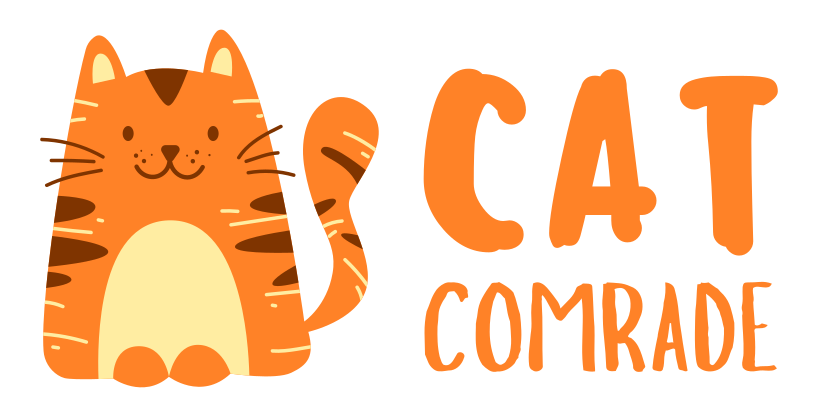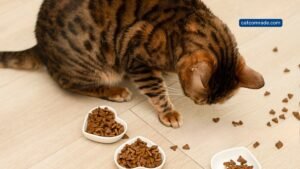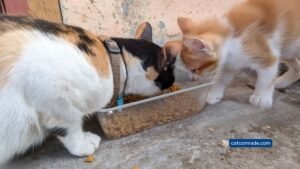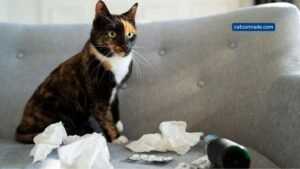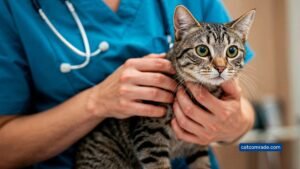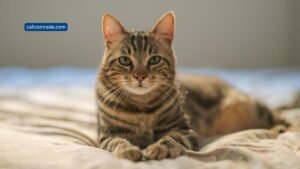What to Feed a Kitten Without Cat Food: Safe & Nutritious Alternatives
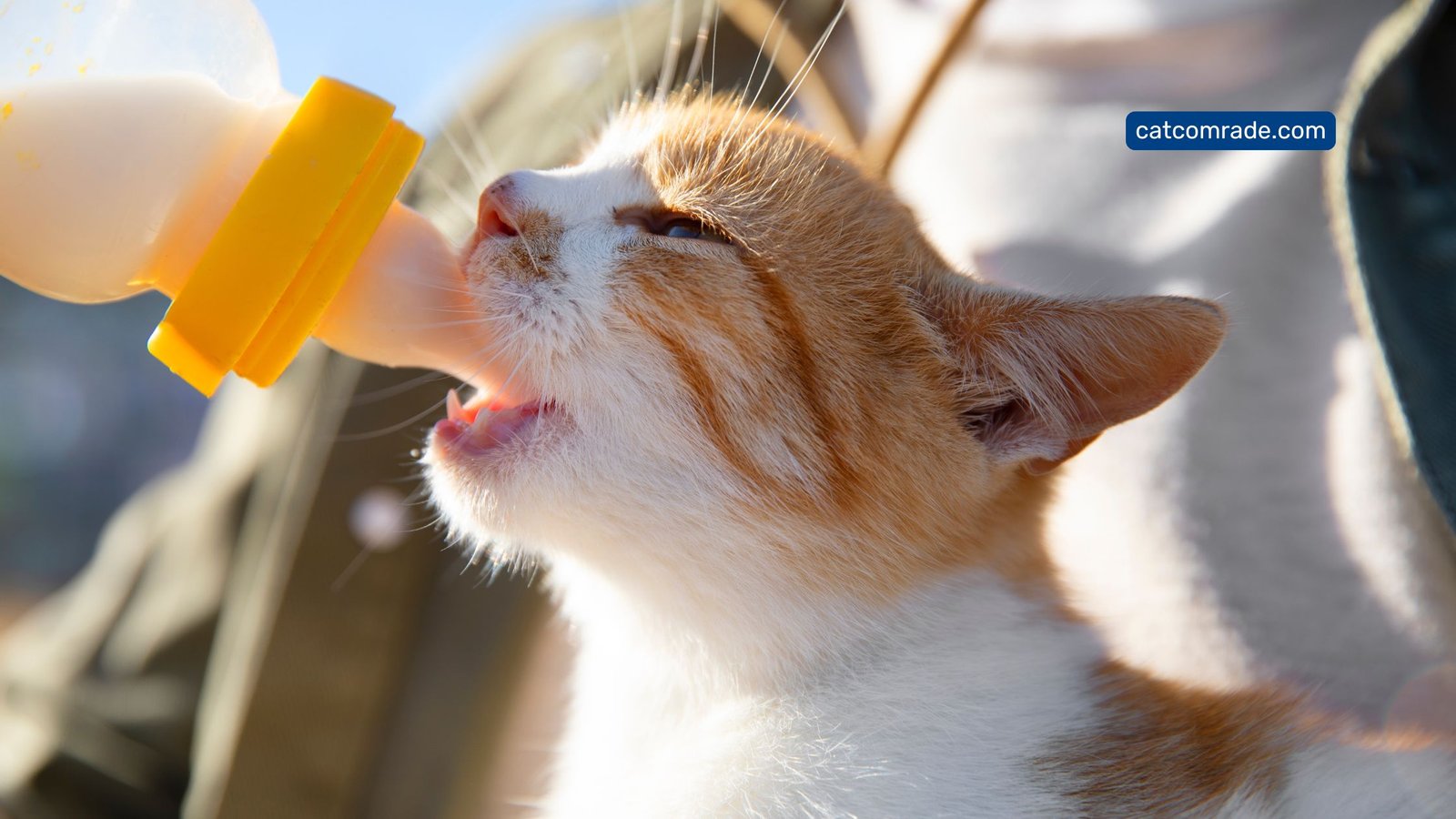
Are you wondering what to feed your kitten when you don’t have cat food on hand?
It can be stressful to see your little furry friend hungry and unsure about what’s safe to give them.
You want to make sure your kitten gets the right nutrients without risking their health.
You’ll discover simple, healthy alternatives that can keep your kitten happy and well-fed until you get proper cat food.
Keep reading to learn exactly what you can offer your kitten—your peace of mind and your pet’s well-being depend on it.
Essential Nutrients For Kittens
Kittens need certain nutrients to grow strong and healthy. Without commercial cat food, feeding them right is very important.
Their tiny bodies require balanced nutrition for energy, growth, and brain development.
Understanding essential nutrients helps provide proper care and avoid health problems.
Proteins And Amino Acids
Proteins are the main building blocks for kittens. They help build muscles, organs, and skin.
Kittens need animal-based proteins like chicken, turkey, or fish.
These proteins provide essential amino acids that kittens cannot make themselves.
Taurine is one key amino acid vital for heart and eye health. Lack of taurine can cause serious illnesses.
Fats And Fatty Acids
Fats supply energy and support brain growth. Fatty acids like Omega-3 and Omega-6 keep skin and fur healthy.
Sources include fish oil and animal fats. These fats also help absorb vitamins.
Too little fat can lead to weak immunity and dull coat. A balanced fat intake is crucial for kitten development.
Vitamins And Minerals
Vitamins and minerals aid many body functions. Calcium and phosphorus build strong bones and teeth.
Vitamin A supports vision and immune defense. B vitamins help convert food into energy.
Iron and zinc support blood and skin health. Fresh meats and small amounts of vegetables provide these nutrients naturally.
Hydration Needs
Kittens must stay well hydrated for health. Water helps digestion, circulation, and temperature control.
Always provide fresh, clean water daily. Wet foods like boiled chicken or fish contain water too.
Avoid giving milk as many kittens are lactose intolerant. Proper hydration supports all body functions.
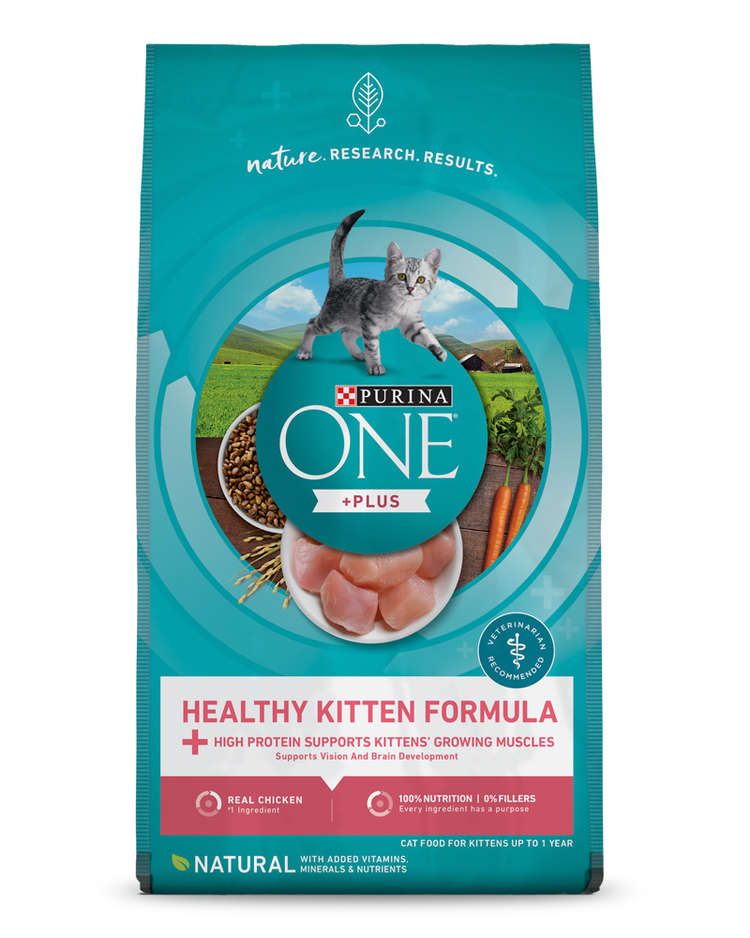
Credit: www.purina.com
Safe Homemade Protein Sources
Feeding a kitten without commercial cat food requires careful choice of proteins. Safe homemade protein sources support healthy growth and energy.
These options are easy to prepare and gentle on a kitten’s stomach. Always ensure the food is plain and free from spices or additives.
Cooked Chicken And Turkey
Chicken and turkey are excellent sources of lean protein. Cook them thoroughly to kill bacteria.
Remove all bones to avoid choking hazards. Serve plain meat without skin or seasoning.
These meats provide essential nutrients for a kitten’s development.
Boiled Eggs
Eggs offer high-quality protein and important vitamins. Boil eggs until the yolk and white are firm.
Do not add salt, butter, or oil. Cut into small pieces for easy eating. Eggs can be a nutritious occasional treat for kittens.
Plain Yogurt And Cottage Cheese
Plain yogurt and cottage cheese supply protein and probiotics. Use unsweetened, plain varieties only.
Avoid flavored or sweetened dairy products. These dairy foods may help digestion but feed in small amounts.
Watch for any signs of lactose intolerance in kittens.
Suitable Carbohydrate Options
Kittens need energy to grow strong and healthy. Carbohydrates give them this energy.
Without cat food, suitable carbs help fill their diet. These options should be easy to digest and gentle on their stomachs.
Choose carbs that provide nutrients and support digestion. Avoid anything spicy or with added salt.
Prepare these foods plain, soft, and well-cooked. Here are two good carbohydrate choices for your kitten.
Cooked Rice And Oatmeal
Cooked rice is mild and easy for kittens to digest. Use plain white rice, fully cooked and soft.
Avoid adding salt, butter, or spices. Rice gives energy and soothes the stomach.
Oatmeal is another gentle carb option. Cook it with water until soft and mushy. Do not use flavored packets or sweeteners.
Oatmeal provides fiber, which helps with digestion. It can be a good filler alongside protein sources.
Mashed Sweet Potatoes
Sweet potatoes are rich in vitamins and fiber. Cook them thoroughly until soft and mash well.
Serve plain without any sugar or seasoning. Sweet potatoes support healthy digestion and give lasting energy.
This carb option adds variety and natural sweetness. Make sure the texture is smooth to avoid choking.
Small amounts mixed with protein make a balanced meal.
Incorporating Vegetables And Fruits
Vegetables and fruits can be part of a kitten’s diet without cat food. They offer vitamins, minerals, and fiber.
These nutrients support growth and digestion. Not all veggies and fruits are safe for kittens.
Choose only the ones that help their health.
Kitten-friendly Veggies
Carrots are good. They provide vitamin A and crunch. Cook them soft to avoid choking. Peas are small and easy to eat.
They contain protein and fiber. Pumpkin helps with digestion. Use plain cooked pumpkin, no spices.
Sweet potatoes are rich in vitamins and gentle on the stomach. Steam or bake before serving. Avoid raw vegetables that can be hard to digest.
Fruits To Avoid
Grapes and raisins are toxic to kittens. They can cause kidney damage. Citrus fruits like oranges and lemons upset the stomach.
Avoid giving any citrus peels or juice. Cherries and pits from fruits contain harmful substances. Do not feed them to kittens.
Apples are safe only without seeds and core. Always remove seeds before offering any fruit.
Stick to safe fruits to keep kittens healthy and happy.
Foods To Avoid For Kittens
Kittens need careful feeding to stay healthy and grow strong. Some foods can harm them or cause serious illness.
Knowing which foods to avoid is very important for their safety. This guide helps you understand what not to feed your kitten without cat food.
Toxic Human Foods
Many common human foods are toxic to kittens. Chocolate contains substances that can hurt their heart and nervous system.
Onions and garlic can damage their red blood cells, causing anemia. Grapes and raisins may cause kidney failure.
Avoid giving any caffeinated drinks or alcohol. Even small amounts can be dangerous.
Harmful Ingredients
Some ingredients in foods harm kittens even if the main food is safe.
Xylitol, a sweetener found in sugar-free gum and candy, can cause low blood sugar and liver damage.
High salt levels can lead to sodium poisoning. Fatty foods can upset their stomach and cause pancreatitis.
Dairy products often cause diarrhea because many kittens are lactose intolerant.
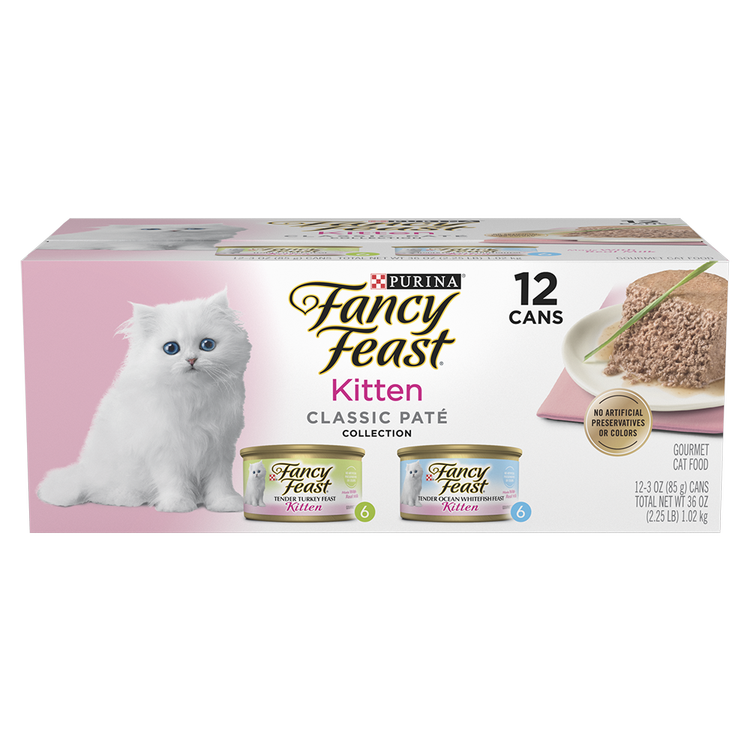
Credit: www.purina.com
Preparing Balanced Meals At Home
Preparing balanced meals at home for a kitten without commercial cat food takes care and attention.
Kittens need many nutrients to grow strong and stay healthy. Homemade meals must include proteins, fats, and some vitamins.
It is important to learn the right way to prepare these meals. This helps avoid common mistakes that can harm your kitten’s health.
Portion Sizes And Frequency
Kittens eat small meals often. They need more calories than adult cats. Feed your kitten four to six small meals daily.
Each portion should match its age and weight. Young kittens eat about 1/4 cup per meal.
Watch your kitten’s weight to adjust portions. Avoid overfeeding to prevent obesity.
Supplements For Nutritional Gaps
Homemade food may lack some nutrients. Taurine is vital for a kitten’s heart and eyes. Use taurine supplements if not in the food.
Calcium and phosphorus keep bones strong. Add supplements to balance these minerals.
Fish oil helps with healthy skin and coat. Consult a vet about the right supplements and doses.
Monitoring Kitten Health Without Cat Food
Monitoring kitten health without cat food is very important. Kittens need the right nutrients to grow strong and healthy.
Feeding them other foods requires careful observation. Watch their behavior and physical condition closely.
Changes may signal a problem with their diet.
Signs Of Nutritional Deficiency
Look for dull fur or hair loss. These can mean lack of essential vitamins or fats. Weakness or low energy may show protein deficiency.
Slow growth or small size can also be a sign. Diarrhea or vomiting happen when the stomach cannot digest food well.
Pale gums or slow healing wounds may point to lack of minerals. Keep an eye on their appetite and mood too.
When To Consult A Veterinarian
Visit a vet if you notice any warning signs. Sudden weight loss needs quick attention. If the kitten is very tired or not moving much, call the vet.
Persistent diarrhea or vomiting is a serious concern. The vet can check for hidden health problems.
They can suggest supplements or better food options. Regular check-ups help keep kittens safe and healthy.
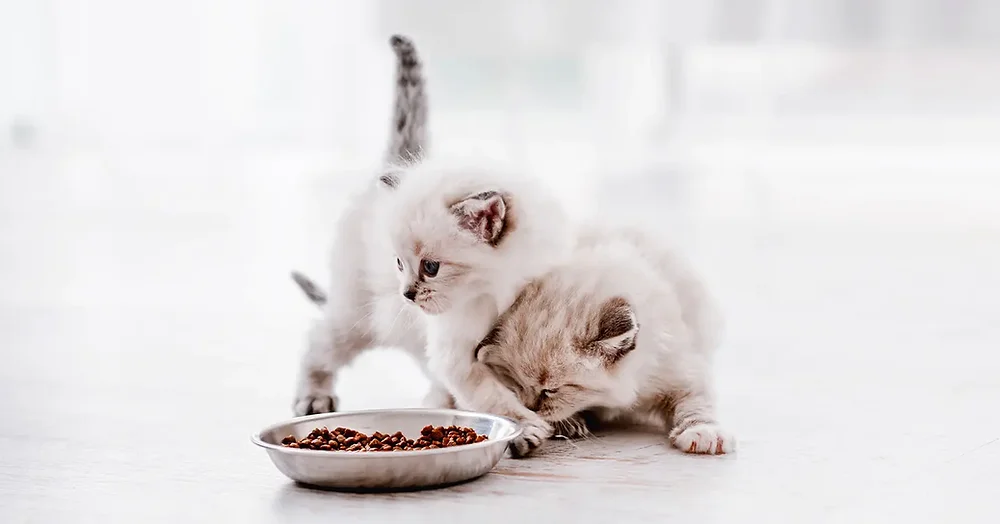
Credit: www.pumpkin.care
Frequently Asked Questions
What Homemade Foods Can Kittens Safely Eat?
Kittens can eat cooked chicken, turkey, and scrambled eggs. Avoid seasoning and bones.
Include small amounts of plain pumpkin for digestion. Always ensure foods are soft and cut into small pieces for easy chewing.
Can Kittens Drink Milk If No Cat Food Is Available?
Most kittens are lactose intolerant. Avoid cow’s milk as it can cause diarrhea. Use kitten milk replacer instead.
Fresh water should always be available to keep them hydrated and healthy.
How Often Should I Feed A Kitten Without Cat Food?
Feed kittens small meals 4 to 6 times daily. Young kittens need frequent feeding for proper growth.
Monitor their weight and appetite to adjust portion sizes accordingly. Always provide fresh water alongside meals.
Are Vegetables Safe For Kittens Without Cat Food?
Yes, some vegetables like cooked carrots or peas are safe. Avoid onions, garlic, and raw vegetables.
Vegetables should only be a small part of their diet. Focus mainly on protein-rich foods for optimal growth.
Conclusion
Feeding a kitten without cat food needs care and attention. Fresh cooked meat, eggs, and plain rice work well.
Avoid harmful foods like onions, chocolate, or milk. Make sure the food is soft and easy to eat. Give small meals often to help their growth.
Always watch how your kitten reacts to new food. A balanced diet keeps kittens healthy and happy.
With patience, you can feed your kitten safely without cat food. Keep learning and caring for your little friend every day.
